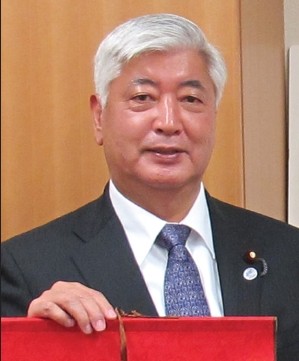Territorial issues stick in throat, but Tokyo and Beijing can’t give up eating

Editor's Note:
As tensions between China and Japan simmer, will there be possibilities of military clashes, or will the relationship get better in 2014? Global Times (GT) reporters Sun Xiaobo and Xie Wenting talked with Gen Nakatani (Nakatani), deputy secretary-general of Japan's ruling Liberal Democratic Party and member of the House of Representatives, in Tokyo recently on these issues.
GT: As a politician who has served in the army, how do you think China and Japan can avert the possibilities of military clashes over the East China Sea?
Nakatani: It's the primary duties of politicians to prevent their country from going to war. When it comes to territorial issues, each country has its own stance. The disputes should be subject to negotiations for solution and be put aside if talks fail. China and Japan have actually put aside territorial issues for about 50 years.
I visit China every year to discuss making rules in the disputed waters and improving contacts so as to avert any incident from turning into a military clash. Accidents have to be avoided, because once they take place, nationalist emotions in the two countries are triggered, and then both sides have no retreat.
China and Japan should carefully review the history and consider never going back to the wars and actions that inflict pains to both sides. On this basis, we need work out rules to avoid conflicts and precautions in case of any such conflict happening.
GT: How do you see China's military development nowadays?
Nakatani: As China keeps robust economic growth and has become a top-class power, its people enjoy a rich life with an optimistic attitude and are actively integrating the Chinese culture with others.
As a world leader, China has to be caring and noble-spirited in dealing with other countries, particularly its neighboring ones. Meanwhile, Japan needs to reconsider its way of dealing with China.
China and Japan have once enjoyed very good economic exchanges and sound political trust. The soured relationship between the two neighbors nowadays may come from the mismatch in approaches that the two governments take in considering relevant issues.
GT: What's your take on the prospects of Sino-Japanese relations in 2014?
Nakatani: The bilateral relationship has to turn better in 2014. As the host of the APEC meeting in Beijing in November, China has to coordinate its relations with other countries. I hope both China and Japan can work together to take the opportunity of this meeting and rid other countries of their worries.
Multiple topics will be discussed on this meeting. Although the territorial and historical issues are like a fish bone stuck in the throat, China and Japan cannot simply give up eating. We have a lot of exchanges to do, and the solution to the territorial and historical issues may come up during these discussions.
The Sino-Japanese relationship will not be severed and hence requires efforts from both sides. A mutually beneficial relationship of the two sides will lead to win-win results.
GT: What is the aim of Japan's attempts to revise the constitution? What do you think of China's concern that Japan may give up pacifism?
Nakatani: The concept of peace has been deeply rooted in the minds of Japanese people and is as unshakable as a huge rock. It's neither necessary nor possible for Japan to consider occupying the territory of any other country.
What the Japanese government and people want to maintain is the current peace and prosperity and the sovereignty of the country, with no higher expectations. However, we have little consciousness of protecting our territory with our own forces. Since WWII Japan's national security has relied on the rest of the world, especially the US, so the focus of the constitutional revision is to allow Japan to protect itself.
Japan and China need to make shared security rules within East Asia. I have taken this as my mission throughout my political life.
Ten years ago, my scheduled trip to China as defense minister to discuss security issues was aborted due to prime minister Junichiro Koizumi's visit to the Yasukuni Shrine. It's reasonable to say that historical issues hinder the progress of security. I made it a target to construct a dialogue framework that goes above the territorial and historical issues.
GT: What's your comment on Shinzo Abe's visit to Yasukuni Shrine?
Nakatani: The two peoples are learning more about each other, but the words and actions of some politicians concerning specific issues can hinder the development to the relations between the two sides.
But the shrine visits by Abe and Junichiro do not mean that Japan wants to rebuild as a military power and pursues militarism. The Japanese public wouldn't accept such a trend.
Concerning the pilgrimage, no one in Japan ever wants to commit acts of aggression of other Asian countries again, nor do they believe wars are good and meaningful. Those disasters Japan has brought to other countries should and will never be forgotten.